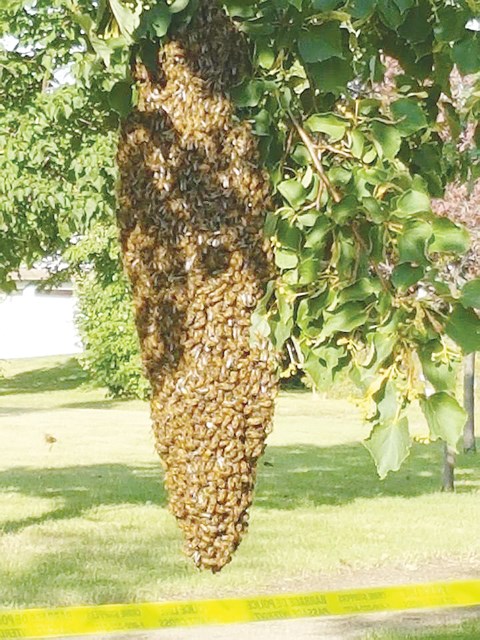When honey bees become too crowded in their homes, the queen will take part of the colony and seek a new place to establish a home.
While scouts are out looking for the perfect spot for the new colony the queen will find a spot and waits protected by her followers in what is commonly known as a swarm.
Such a swarm was recently found in a City park on Fenson Crescent in the city.
When informed of the swarm Commissionaire Phil DeVos called Brian and Yvonne Bueckert, local apiarists (beekeepers).
Brian Bueckert said a bee swarm can be unsettling for many.
“Some people are pretty uptight about them,” he said, adding when they were contacted they immediately went to take a look.
Bueckert said the swarm were European honeybees.
“It was a fairly small swarm compared to others I’ve captured,” he said, estimating 5000.
When someone sees a swarm they should understand somewhere in the centre of the ball of bees is the queen.
The rest of the bees “will do everything in their power to protect their queen,” said Bueckert.
So if the swarm is disturbed, the loud noise of a lawnmower coming too close, or someone throwing something at the swarm they may attack.
“Two or three stings will hurt, a 100 stings you’ll be in the hospital,” said Bueckert.
A swarm is actually a rather common occurrence as it is part of a colony’s growth.
“Bees are programmed to expand and grow,” said Bueckert, adding the bees in a swarm “… are just looking for a place to live.”
Typically a bee swarm is located close to the colony it broke off from, sometimes as close as a few feet, to up to a couple of city blocks, said Bueckert, adding that suggests a larger bee colony is lodged somewhere in the park area. He said a colony can locate in a variety of places such as a tree, an old tire, or the eaves or attic of a house.
In the case of the small swarm, Bueckert said the bees were quite calm, with a gentle disposition, so once he cut the branch off the tree with the swarm on it, and placed in in a bee box, they settled into their new home quickly.
The bees are now on the Bueckert farm where he said they are busy collecting nectar.
“They’re quite comfortable in a bee box here on the farm,” he said.
Bueckert said given the date, and the small size of the colony, it is unlikely to produce enough honey to harvest, but should put up enough to allow the colony to overwinter.




